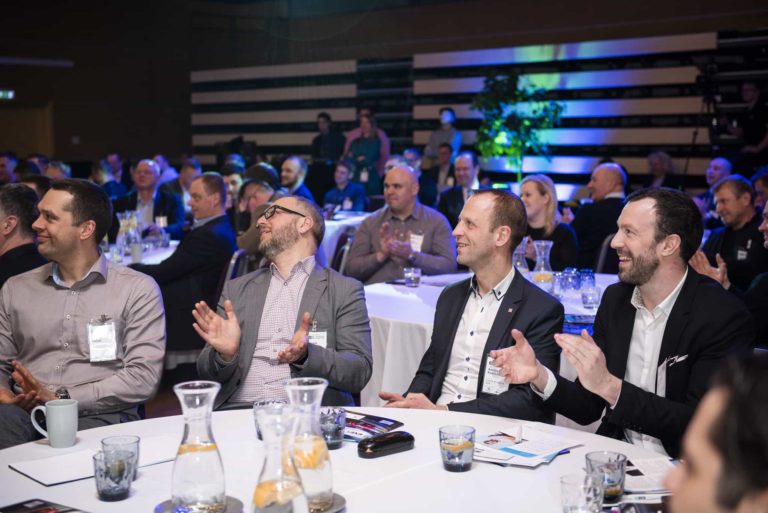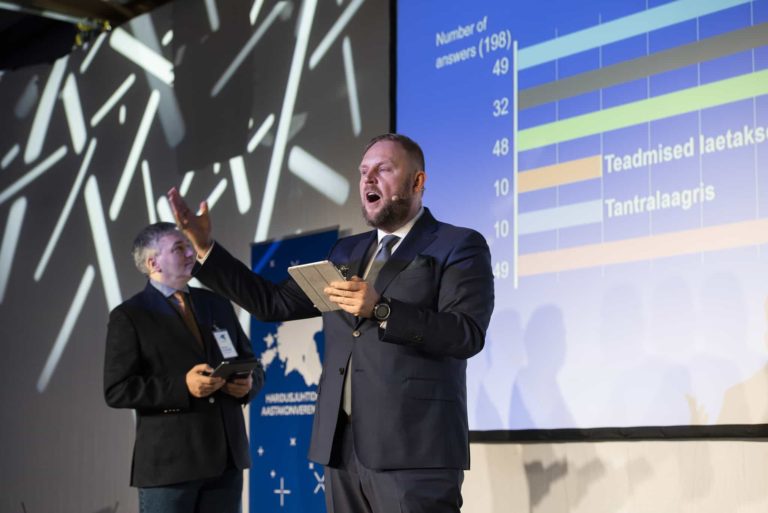When you’re organising a big event, it’s crucial that you never lose sight of the bigger picture. It’s not about you. It’s about the team and the people. The success of the event is down to the hard work of the team around you.
We hereby wish to share the experiences we have gained over the last 15 years. We are hoping to help save conference teams time, money and lessen the their stress. The first part of the Conference School covers the subject of forming the organizational team.
How to organize a conference using existing personnel?
Three skills
Broadly speaking, the team of organizers needs people with three types of skills.
First, it needs someone who would be responsible for the content. This person does not have to know absolutely everything. Rather, they need to create a network of people who can help come up with the hottest topics and the best speakers in the field. That said, it would speed up the process if she were a frequent conference visitor and a natural networker. More about the event content creation, in the II part of Conference School.
Secondly, it needs a sales and marketing specialist if the conference is out-of-house. For example, to the company’s clients. This person would ideally have connection with the target attendees. Or, at least, have experience in reaching them with relative ease.
And third, it needs someone who can manage the plans for the conference. For instance, to ensure the technical implementation of the event. Preferably, it would be someone with prior experience in organizing events. Also, with connections to various vendors, including venue owners, technicians and event equipment rentals.
One of these three should also be in charge of the whole thing and take the project manager’s role. However, in the case of organizing bigger conferences, it makes sense to have a dedicated person who would make sure that all parties are on top of everything.
Amount of people
In a perfect world, the whole team consists of three or four people. That’s because issues usually arise when too many people wish to be a part of the organizational team. If there are too many opinions involved, then preparations may lag behind and the central point of the conference may get blurred. This will lead to an end result that is so generic that it will not bother anyone, but it will also not excite anyone.
However, it makes sense filling those three main roles with more people. Provided that the event will have multiple stages focusing on different topics and/or a few hundred or more attendees. In such occasion, it would be wise dividing people into senior and junior roles. The seniors would then participate the bigger meetings, while juniors would be focusing on fulfilling their particular tasks. Meanwhile, it would also simplify the work if the team would be using various project management tools instead of constantly meeting one another.
When the conference is for the employees or clients of the company, it is also important to involve the board with the organisation of the event from the start. Especially as they would need to give their input for the overall vision of the event. However, the board should not steamroll over the organising team. That will only demotivate them, as well as be detrimental to the event. That is where the project manager would also be managing the board.

When to involve professional agencies?
Outsourcing the organisation of the conference to a professional conference organiser essentially means that we are expanding our team with external skills and labour. Accordingly, when looking for such an agency we should look at the same criteria as to when hiring new employees:
professional conference organiser’s previous experience,
recommendations from previous and current clients,
ideas the agency has for carrying out our event,
their capacity in bringing their ideas to life.
Ideally, the conference organiser will become a member of the client’s team for a while and will work in the same rhythm as the team. In some ways, the agency’s personnel should be moving in with their clients.
Of course, buying such a service might be somewhat expensive. Yet the overall costs would remain similar to when we would do everything in-house with the labour costs divided differently. Sometimes they might even decrease due to the service providers have dealt with various vendors, as well as experience regarding operating leaner and faster.
If we are choosing a professional partner via a procurement, then we should not use just price-based evaluation criteria. We often hear complaints from the market about collaborations that got started through a procurement, both from the buyers and the service providers. Lately, though, more emphasis is on content rather than price in procurement evaluation criteria. That has enabled companies to find more suitable professional partners for their projects.
How to involve our clients and partners?
Having our partners and suppliers be a part of the conference team will help us better understand what kind of content matters most to them. At the same time, it would help us grow our skillset in organisation and finances. Involving our suppliers with the organisational team is especially useful as in addition to their knowledge and relationships, they may also add financial support to the event.
At times, we should even think about cooperating with companies who are offering their services to the same target group but are not our direct competitors. Especially, as combining the knowledge and resources with them give all of us a chance to organise a bigger event. One that really helps to educate the market and in the long term grow our businesses.
For example, in Nordics, there are multiple startup events with all the major ecosystem players involved, such as Latitude59, SLUSH and TechBBQ. They are all hosted by dedicated teams that have turned to various companies, co-working spaces and governmental entities. Those have given their insight as to what the local ecosystem would most benefit from. The clearly define time periods are the key to their success: specified when they will be working on ideation, the creation of action plans and finally, the realization of those plans. Additionally, they decide on who contributes to which phase and how much they contribute in the very beginning of the whole planning process.
When to involve volunteers?
In recent years, events have started to involve volunteers as part of their organising teams. This means that they have opened their doors to people who would love to help out without asking for full payment but instead work for free tickets, food and experience.
For the most part, volunteers tend to be students and other young people who want to get new things on their CVs. At the same time, many companies incite their employees to volunteer as part of their corporate social responsibility programs. Meanwhile, the list of people happily volunteering at events includes elderly, public servants, unemployed and many others.
Volunteers come handy especially when hosting events with a few hundred or more attendees. That is usually when events become so big that a small dedicated team cannot handle everything by themselves.
Of course, it is possible to hire various service providers like catering, cleaning and security (recommended). But tasks like registration and help desk, venue guides, speaker assistance etc can all easily be filled with volunteers. Meanwhile, some volunteers might actually be able to give a helping hand for schedule planning, marketing and operations.
When deciding to use volunteers, it is important to remember that they are usually not professional service providers. Which is why we should also hire a volunteer manager, as well as use management tools, such as Zelos to make it all work bette


